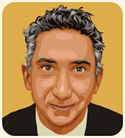Now we know: President Hugo Chavez admitted last night that he has cancer.
A lot hinges on his recovery.
The debate – and fear – swirling around Venezuelan President Hugo Chavez’s absence demonstrates the institution-less condition that twelve years of his government have left Venezuela in. Where before his absence after June 10 left the country wondering about his condition, the news now of his battle with cancer has opposition and allies alike all-too aware of his fallibility–and worrying about the polarized country’s future. His absence has left a vacuum in Venezuela underscoring a system that is not only incapable of selecting a replacement but also institutionally incapable of balancing competing (some of them criminal and potentially violent) elements within the government. The risk–not just now–is that even should he return to full health, Venezuela is fast becoming a failed state, held together by one sultanistic leader and the opposition’s hatred of him.
After his speech last night, the Vice President, Elias Jaua and others called for “maximum unity” in the Partido Unido Socialista de Venezuela (PSUV). That unity is likely to fray with President Chavez’s uncertain recovery and his probable intermittent absence as he seeks treatment. Criminal elements within the regime are likely to pursue any means possible to avoid being revealed and relinquishing their nefarious and lucrative businesses. Already there are rumors of individuals within the government reaching out to segments of the opposition.
The situation should be a reminder, not just to the U.S. whose policy on Venezuela has been adrift the last three years but also to Venezuela’s neighbors that this regime–and the eventual transition to another leader (whenever and whoever that may be)–is not likely to follow the relatively smooth patterns of the democratic transitions of the 1980s. The U.S. and neighboring governments should see this as an opportunity to begin to lay plans for how to best deal the likely implosion of the Bolivarian government, in a way that should involve efforts to form a government of national unity and rebuild consensus and the rule of law in the polarized and politicized country.
In the meantime, one of the worst things the opposition could do now is to try to force a confrontation with the government. In the past, the opposition engaged in a deluded and ultimately dangerous strategy of street politics–organizing mass protests as a sign of strength in the hopes of bringing down the government or provoking a violent reaction by elements within it. Unfortunately, on April 11, 2002 they got what they wanted–though at the cost of human life, Chavez came out the victor. Doing the same now could provoke a political crisis with dangerous consequences. Let’s hope now that they have rediscovered the merits of competing in elections and have a number of new, fresh leaders that they use this opportunity to double down and focus on the presidential elections in 2012.





